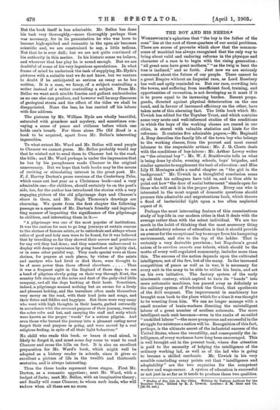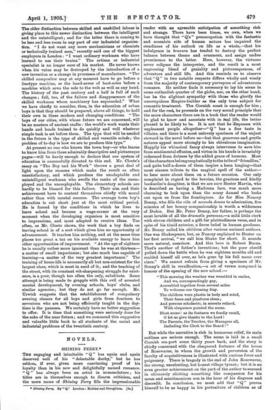WORDSWORTH'S aphorism that "the boy is the father of the
man" lies at the root of three-quarters of our social problems. There are scores of proverbs which show that the common- sense of mankind has always recognised that the only way to bring about valid and enduring reforms in the physique and character of a race is to begin with the rising generation : "all great men have great mothers," "as the twig is bent the tree is inclined," and so forth. Just now we are seriously concerned about the future of our people. There cannot be a great Empire without an Imperial race, as Lord Rosebery has well and aptly reminded us. But our race, crowding into the towns, and suffering from insufficient food, training, and opportunities of recreation, is not developing as it must if it is to prove equal to its increasing burden. Recent propa- ganda, directed against physical deterioration on the one hand, and in favour of increased efficiency on the other, have taken note of this alarming fact. The little book which Mr. Urwick has edited for the Toynbee Trust, and which contains some very acute and well-informed studies of the conditions in which the boys of the working classes are reared in our cities, is stored with valuable statistics and hints for the reformer. It contains five admirable papers,—Mr. Reginald A. Bray describes the family life of the town boy who belongs to the working classes, from the poorest and most casual labourer to the respectable artisan : Mr. J. G. Cloete deals with the conditions of boy-labour : Mr. Arthur Lowry writes on "the criminal boy " : Mr. W. J. Braithwaite tells us what is being done by clubs, evening schools, boys' brigades, and similar agencies to supplement the task of education : and Miss Lily H. Montague adds a useful chapter on "the girl in the background." Mr. Urwick in a thoughtful conclusion sums up all that his colleagues have told us, and is thus able to point out how "the door of social betterment "stands open for those who will seek it in the proper place. Every one who is interested in the most urgent of domestic questions should procure this admirable and unpretentious book, which throws a flood of bactericidal light upon a too often neglected aspect of it.
Perhaps the most interesting feature of this conscientious study of boy-life in our modern cities is that it deals with the average rather than with the select individual. We are too much in the habit of thinking that the most necessary thing in a satisfactory scheme of education is that it should provide an avenue for the exceptional boy to escape from his hampering environment, and rise to the top of the ladder. That is certainly a very desirable provision ; but Napoleon's grand axiom of la earribre ouverte aux talents, which should be the motto of every well-regulated community, includes more than this. The success of the nation depends upon the cultivated intelligence, not of the few, but of the many. In the increased competition of peace as well as in war, it is necessary for every unit in the army to be able to utilise his brain, and act on his own initiative. The factory system of the early nineteenth century, which aspired to turn its "hands" into mere automatic machines, has passed away as definitely as the military system of Frederick the Great, that apotheosis of the drill sergeant. The improvement in machinery has brought man back to the place which for a time it was thought to be wresting from him. We can no longer manage with a small number of brain-workers directing the unintelligent labour of a great number of soulless automata. The more intelligent each unit becomes—even in the ranks of so-called "unskilled labour "—the more prosperous and successful in the struggle for existence a nation will be. Recognition of this fact, perhaps, is the ultimate secret of the industrial success of the United States, where the versatility, and consequently the in- telligence, of every workman have long been encouraged. This is well brought out in the present book, where due attention is paid to the necessity of helping the intelligence of the ordinary working lad, as well as of the lad who is going to become a skilled mechanic. Mr. Urwick in his very sensible concluding essay points out that "intelligence and adaptability" are the two requisites for the competent worker and wage-earner. A system of education is successful or not just in so far as it tends to produce these two qualities.
• Studies of Boy Life n Our Cities. Written by Various Authors for the Toynbee Trust. Edited by E. J. urwick. London: J. X. Dent and Co. neti The older distinction between skilled and unskilled labour is giving place to this newer distinction between the intelligent and the unintelligent ; and for the latter there is coming to be less and less room in any part of our industrial organisa- tion. "I do not want any more mechanicians or chemists or technically trained men," recently said one of the biggest employers in London : "I want ordinary workmen who have learned to use their brains." The artisan or industrial specialist is no longer sure of his market. He never knows when his value may be destroyed by the introduction of a new invention or a change in processes of manufacture. "The skilled compositor may at any moment have to go before a linotype machine, or the hand-sewer of boot-soles before a machine which sews the sole to the welt as well as any hand. The history of the past century and a half is full of such changes ; full, too, of the failure and disappearance of the skilled workman whom machinery has superseded." What we have chiefly to consider, then, in the education of urban boys is that they should be prepared, above all things, to hold their own in these modern and changing conditions. "The boys of our cities, with whose future we are concerned, will be no masters of ancient crafts : the world's work wants their hands and heads trained to do quickly and well whatever simple task is set before them. The type that will be needed in the future is the type of skilled and versatile minds; the problem of to-day is how we are to produce this type."
At present no one who knows the town boy—or who learns to know him from these admirably descriptive and picturesque pages—will be hardy enough to declare that our system of education is successfully directed to this end. Mr. Cloete's essay on "The Boy and his Work" throws a great deal of light upon the reasons which make the result so often unsatisfactory, and which produce the una.daptable and unintelligent workman who swells the ranks of the unem- ployed and the unemployable. The elementary schools are hardly to be blamed for this failure. Their aim and their achievement have to content themselves chiefly with moral rather than with mental success. The average town boy's education is cut short just at the most critical period. He is forced by the conditions in which he lives to leave school and become a. wage-earner at the very moment when the developing organism is most sensitive to impressions, and most adapted to receive ideas. Too often, as Mr. Cloete shows, the work that a boy finds on leaving school is of a sort which gives him no opportunity of advancement. It teaches him nothing, and at the same time places too great a tax on his available energy to leave him other opportunities of improvement. "At the age of eighteen he is usually rather more ignorant than he was at thirteen— a matter of small importance; but also much less capable of learning—a matter of the very greatest importance." The training of home-life is necessarily all but non-existent for the largest class, which is most in need of it ; and the teaching of the street, with its constant wit-sharpening struggle for exist- ence, is a poor, though too often the only, substitute. Some attempt is being made to grapple with this evil of arrested mental development, by evening schools, boys' clubs, and similar agencies ; but they do not go far enough. Mr. Urwick suggests that the establishment of compulsory evening classes for all boys and girls from fourteen to seventeen who are not being efficiently taught in the day- time is the panacea. We certainly have no better suggestion to offer. It is time that something were seriously done for the Bake of the near future ; and we commend this suggestive and valuable little book to all students of the social and industrial problems of the twentieth century.







































 Previous page
Previous page